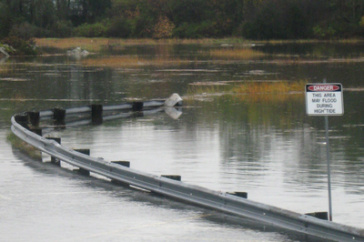UNH Faculty Ranked Among the Nation's Best Researchers

Photo of inundated road by Roger Stephenson courtesy of Piscataqua Region Estuaries Partnership's "2011 King Tide Photo Contest."
DURHAM, N.H. -- University of New Hampshire scientists are among the nation's best in scientific research, according to a recent report from Thomson Reuters Corporation, formerly the Institute for Scientific Information, that ranks high-impact U.S. universities.
The organization, which ranked universities based on how frequently their work was cited by other researchers, found that UNH scientists ranked fifth nationwide in environmental science/ecology research between 2005 and 2009.
The rankings included papers in scientific journals written by scientists in the top 100 federally funded U.S. universities that published at least 100 papers. Citations are important because they indicate cutting-edge scientific findings that lay the groundwork for advanced research, according to the institute's staff.
UNH was in the company of other top universities including SUNY Stony Brook, University of Missouri St. Louis, University of Southern California and Princeton University.
Much of UNH's research in these highly ranked areas is conducted under the auspices of the university's internationally-renowned Institute for the Study of Earth, Oceans, and Space (EOS), as well as in its College of Life Sciences and Agriculture.
Changsheng Li, a research faculty member in EOS, had the greatest number of citations and total papers published and the single most highly cited paper UNH produced came from Serita Frey's lab in the department of Natural Resources and the Environment.
The University of New Hampshire, founded in 1866, is a world-class public research university with the feel of a New England liberal arts college. A land, sea, and space-grant university, UNH is the state's flagship public institution, enrolling 12,200 undergraduate and 2,300 graduate students.
-30-
Latest News
-
July 2, 2024
-
June 18, 2024
-
June 18, 2024
-
May 17, 2024
-
May 14, 2024

















































